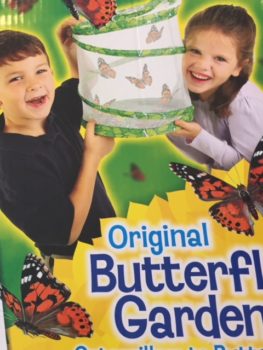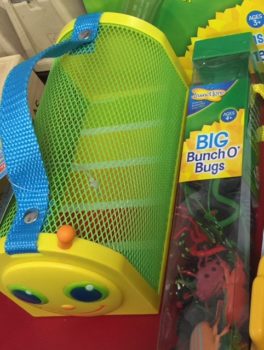Nature Exploration Play Activities for Kids
Nature Exploration Play Activities for Kids
Children love to explore nature and the evolution of nature at a very early age. My toddler granddaughters and early elementary grandkids love to play in the garden and explore nature, smell various flowers, dissect plants, and observe insects and bugs per the following activities:
Materials:
- The Very Hungry Caterpillar book
- Bug box
- Dual lenses magnifying glass
- Big Bunch of Bugs kit
- Mini rake and scooper
- Kits for raising insects (i.e. Lore Original Butterfly Garden)
 Activities:
Activities:
- Read The Very Hungry Caterpillar and ask the following:
- What did the hungry caterpillar eat?
- What would you eat if you were a caterpillar?
- Why did the caterpillar have to eat so much food?
- How did the caterpillar become a beautiful butterfly?
- Have you seen a caterpillar or butterfly in the garden? Describe what they look like and how they act?
- What did you learn from this story?
- Compare this story to another about the metamorphosis of a caterpillar to a butterfly.
- Draw a picture of you as a butterfly and describe what you ate to become a butterfly.
- Collect some bugs in a bug box and use a magnifying glass to observe the behavior of your collection of bugs.
- What different types of bugs or insects did you collect?
- What bugs are larger, faster, slower, or smaller?
- How many legs does each bug or insect have?
- Can you make a chart of the various bugs and insects and organize them by the number of legs they have (i.e. 4 legs, 6 legs, 8 legs, more or less legs)?
- What does each bug need to eat to stay heathy and grow?
- Create an insect garden by digging up the dirt with a rake and scope and burying your plastic bugs into the dirt.
- Organize a scavenger hunt with your siblings and friends and look for the various plastic bugs in the garden. Organize them by type as you find them.
- Play math games with your bugs and determine how many each of your friends collect and how many different types each has collected.
- Make a math chart showing the different types of bugs each child has collected and list the number collected of each type.
- Read books about each type of bug to learn how to care for them in your garden. Draw bug pictures and look for these bugs in your yard.
- What types of plants does each bug like to eat?
- Grow caterpillars to butterflies using the butterfly kit or another kit for building ant farms or other insect habitats to observe insect growth.
- What did you do to help the caterpillar grow? Make a calendar of changes in the daily growth of the caterpillar until it becomes a butterfly.
- Describe the metamorphosis of a caterpillar to a butterfly.
- What do caterpillars eat to become butterflies?
- Research what other insects change into another type of insect.
 Common Core State Standards:
Common Core State Standards:
Listed below are a few relevant California Common Core Standards for English Language Arts and Literacy:
- Kindergarten: With prompting and support, ask and answer questions about key details in a text.
- Grade 1: Ask and answer questions about key details in a text.
- Grade 2: Ask and answer such questions as who, what, where, when, why, and how to demonstrate understanding of key details in a text.
- Kindergarten: With prompting and support, compare and contrast the adventures and experiences of characters in familiar stories.
- Kindergarten: Actively engage in group reading activities with purpose and understanding. Per section “b”, use illustrations and context to make predictions about text.
Listed below are two relevant California Common Core Standards for Mathematics:
- Kindergarten Counting and Cardinality: Count to tell the number of objects. Understand the relationship between numbers and quantities; connect counting to cardinality.
- Kindergarten Operations and Algebraic Thinking: Understand addition as putting together and adding to, and understand subtraction as taking apart and taking from.
- Grade 1 Measurement and Data: Represent and interpret data. Organize, represent, and interpret data with up to three categories; ask and answer questions about the total number of data points, how many in each category, and how many more or less are in one category than in another.
Copyright © 2018 by GenParenting
 Welcome to our six-week summer blog reading series for parents and their children. Starting on Tuesday, July 10 through Thursday, August 16 we will provide three blogs each week using the Common Core Standards and STEAM activities per the following schedule:
Welcome to our six-week summer blog reading series for parents and their children. Starting on Tuesday, July 10 through Thursday, August 16 we will provide three blogs each week using the Common Core Standards and STEAM activities per the following schedule:
 Catch a Bad Case of the Travel Bug
Catch a Bad Case of the Travel Bug When children get to those double digit years, they change. The sweet, playful, mischievous children become challenging, moody, argumentative preteens. Parenting becomes more difficult because these new changes wear on parents’ patience. They want to argue back, meet challenges by asserting their authority, and adjust that negative attitude.
When children get to those double digit years, they change. The sweet, playful, mischievous children become challenging, moody, argumentative preteens. Parenting becomes more difficult because these new changes wear on parents’ patience. They want to argue back, meet challenges by asserting their authority, and adjust that negative attitude.